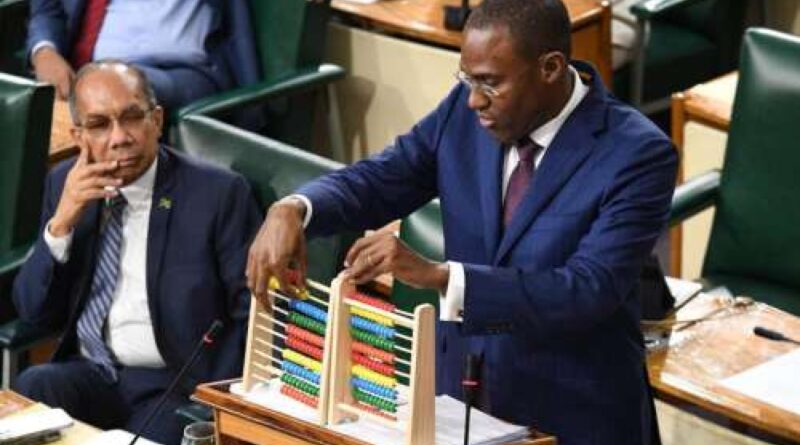$367b for salaries
Finance Minister Dr Nigel Clarke uses two abacus maths tools to illustrate a point as he opens the 2023/24 Budget Debate in Parliament on Tuesday. (Photo: Joseph Wellington)
MORE than half of Government’s $657.2-billion allocation for non-debt recurrent expenditure will go towards the compensation of public sector employees as the Administration forges ahead with its wage restructuring programme.
Finance and the Public Service Minister Dr Nigel Clarke, in opening the 2022/23 Budget Debate Tuesday, said compensation of employees accounts for $367.4 billion or 56 per cent of the non-debt recurrent expenditure.
“In this budget, we have $32.8 billion to meet the estimated second-year cost of the new compensation system; $6.5 billion to public sector health insurance; and $1.4 billion for the [Government’s] arrears to the National Housing Trust (NHT),” he said.
The 2023/3024 trillion-dollar budget also outlines capital expenditure of $65.4 billion, $280.6 billion for debt servicing, and below the line expenditure of $8.4 billion.
In terms of the recurrent programmes, Dr Clarke said $289.8 billion has been set aside for this, with the Ministry of Finance to receive $42 billion for public sector pension and $3.1 billion to support to local authorities for street lights.
“We have $4.7 billion for the maintenance of roads, repairs to roads, and $1.2 billion for bridge development and construction; $7 billion for supporting the Jamaica Urban Transit Company and $142.9 billion for the Ministry of Education which represents 22 per cent of non-debt expenditure. Of this amount, $9.3 billion is for school nutrition support, and $15 billion for The University of the West Indies and the University of Technology,” he said.
The finance minister further announced that the Ministry of Labour and Social Security has been allotted $8.4 billion for the Programme of Advancement Through Health and Education (PATH) beneficiaries, and this reflects the 18 per cent increase approved by Cabinet. In addition, he said the Ministry of Health and Wellness will be given $14.7 billion for drugs and medical supplies, and $10 billion for University Hospital of the West Indies.
Further, the Ministry of National Security will be allotted $59 billion for the police; $32 billion for the Jamaica Defence Force; $11 billion for the Department of Correctional Services; and $2 billion for the Major Organised Crime and Anti-Corruption Agency.
Turning to capital expenditure, Dr Clarke noted that this is programmed at $75.4 billion and the main programmes include $22.1 billion for the Southern Coastal Highway Improvement Project; $7.2 billion for the Montego Bay Perimeter Road [Project] and a combined $7 billion for the Ministry of Agriculture towards the Southern Plains Agriculture Development project and the Essex Valley Irrigation Infrastructure Development Programme.
He noted, as well, that $1.9 billion has been set aside to procure 50 more garbage trucks for the National Solid Waste Management Authority (NSWMA).
“We are spending money to expand the hospital and clinic network in the country — $2.7 billion for the Spanish Town Hospital; $2 billion to commence Phase III works at the Cornwall Regional Hospital; and $530 million for the redevelopment and modernisation of the University Hospital,” Dr Clarke said.
The finance minister also noted that there is an $8-billion capital expenditure for projects to get approved throughout the year.
The new budget followed a record number of supplementary estimates tabled in the House of Representatives in any one fiscal year — four in all — which were primarily driven by the need for funds to complete spending on the second year of a three-year public sector restructuring programme.

